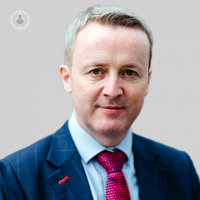Fatigue: not just being tired
Written by:Everyone has experienced being tired, but it’s possible that you may be suffering from fatigue. In this first of two articles, consultant rheumatologist and chronic fatigue syndrome expert Dr Gerald Coakley explains the meaning of fatigue and how it differs from being simply tired.

What is fatigue?
We all know what we mean when we use the word “fatigue” in everyday conversation. We mean that we are tired. But fatigue can have many shades of meaning, for example referring to a lack of energy, a sense of physical weakness, or a feeling that tasks require more effort than they should. It can refer to a feeling of sleepiness, a desire to rest, a lack of motivation. Boredom in your work or home life is an important cause of feeling fatigued.
To experience fatigue in these situations is a normal aspect of everyday life, especially when we have not slept well, when we are under stress, or even when we are hungry.
What are the symptoms and causes of fatigue?
There are many symptoms of fatigue. Some people who consult me tell me that carrying out normal daily activities like climbing the stairs or hanging up the washing requires an undue sense of effort. Others complain of feeling sleepy, irritable, or low in mood.
But apart from the nuisance-level fatigue we all experience in daily life from time to time, there are lots of medical conditions that commonly present with fatigue as an important symptom. For example, heart failure in which the heart muscle does not pump efficiently, lung disease caused by smoking, hormonal problems like thyroid disease, or adrenal gland problems like Addison’s disease. We also see fatigue in chronic liver or kidney disease, in coeliac disease which damages the small bowel lining due to gluten intolerance. Fatigue is common also with anaemia, many types of medications like antidepressants, painkillers, and with alcohol excess and other forms of substance abuse.
How can people tell the difference between tiredness and fatigue?
What we have been discussing until now is normal, everyday fatigue or tiredness, and fatigue due to common health disorders.
It is important to distinguish this kind of everyday tiredness or fatigue from the much rarer condition of myalgic encephalomyelitis (ME)/chronic fatigue syndrome (CFS). This is a potentially much more serious condition in which physical and mental fatigue develop usually quite abruptly, and often, although not always, after an infection. This type of fatigue is intrusive and stops people carrying out normal activities like exercise, socialising, or sometimes even going to school, to university, or to work. In the worst cases, people can be housebound or even bedbound, and it is this severity of fatigue that helps to make ME/CFS clearly different from normal fatigue.
The other hallmark of ME/CFS, without which the diagnosis cannot be made, is known as post-exertional malaise (PEM), which refers to a marked increase in fatigue occurring usually 24 hours or more after increased physical or intellectual effort.
Is fatigue an indicator of any other condition?
Yes, there are numerous medical conditions that can cause fatigue, some of we have already covered. I am a consultant rheumatologist, and the majority of my professional work is spent caring for people with inflammatory diseases like rheumatoid arthritis, psoriatic arthritis, inflammatory spinal disease, lupus, and other forms of autoimmune disease. For these patients, alongside joint pain and swelling, fatigue is for many the most intrusive aspect of living with their arthritis, and the symptom that is unfortunately the most difficult for doctors to get to grips with or to put right.
Fatigue is also seen in conditions like obstructive sleep apnoea, when people snore loudly and stop breathing many times during the night while asleep. Excess sleepiness can also be seen in sleep disorders like restless leg syndrome or in narcolepsy, a rare brain disorder that causes sufferers to fall asleep suddenly at inappropriate times, for example mid-sentence. So in difficult cases, consulting a physician experienced in assessing fatigue problems is key to reaching the correct diagnosis and management plan.
If you have been feeling abnormally tired and think you may be suffering from fatigue, you can go to Dr Coakley's profile and book a consultation.


